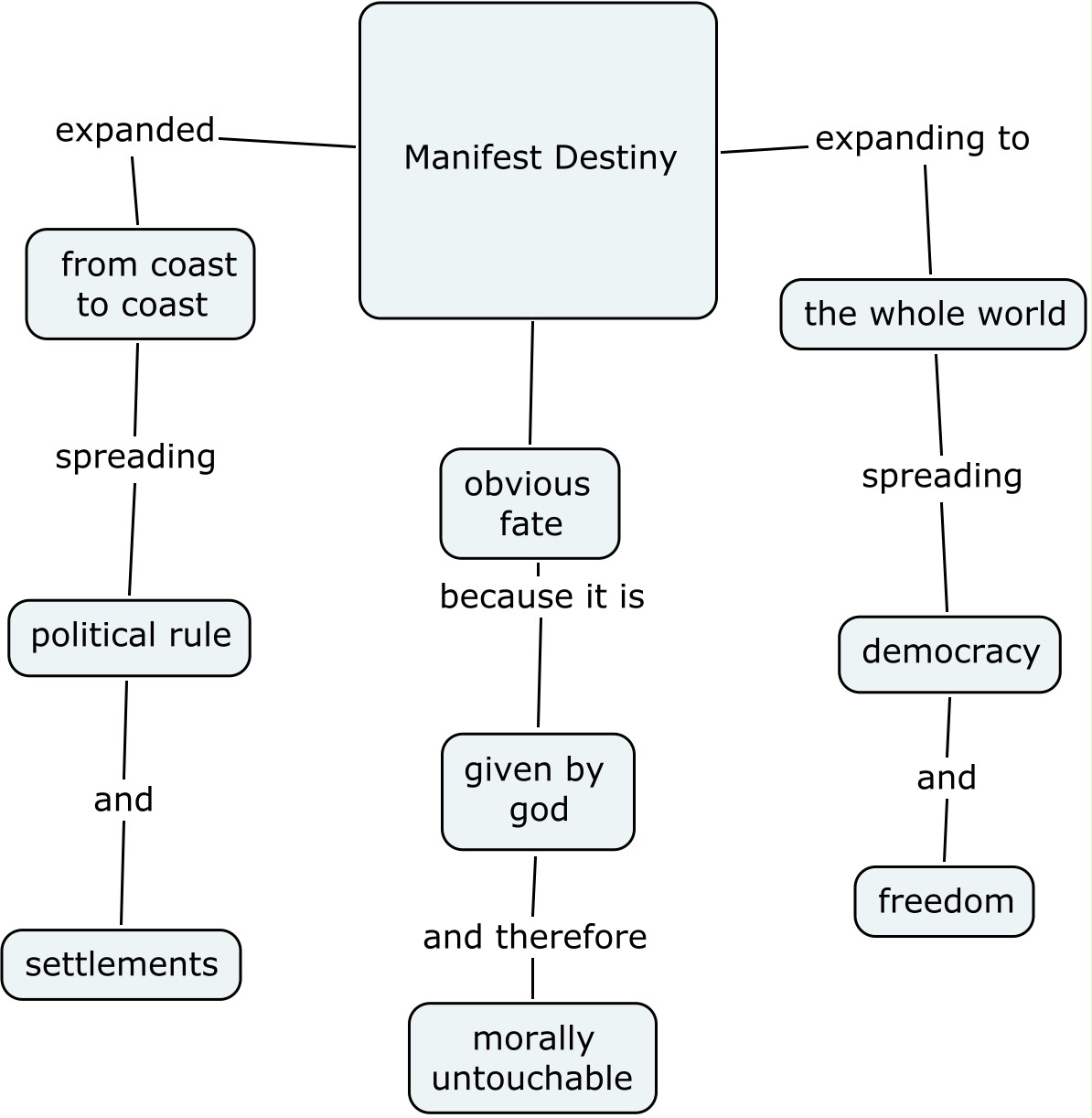
Click here to read about this map [0]
The term manifest destiny was used in the 1840’s and 1850’s to describe America’s goal of expanding its territory all the way to the Pacific Ocean. Using these words to describe expansionism makes a political and military goal sound more like the fate of the nation, and the natural course of history. America was born to be bicoastal, and our great democracy was born to bring freedom to the continent, and in time, the world.
Manifest destiny was an umbrella term, kept purposely vague so it could encompass many ideas. Expansionism kept company with America’s mission to spread democracy, nationalism, and the superiority of American values. The ambiguity of the term gave it enormous power, because no one definition could be pinned down and refuted.
After the civil war, manifest destiny became less of a catch phrase, but the concept still plays a major role in U.S. policy. Although the exact phrase is never used, George W. Bush’s rhetoric is filled with the same language and concepts.
“The story of America is the story of expanding liberty: an ever-widening circle, constantly growing to reach further and include more. Our nation’s founding commitment is still our deepest commitment: in our world, and here at home, we will extend the frontiers of freedom.” This quote from a Bush speech uses language that reaches way back through history to the founding of our country. The metaphor of “extending the frontiers” brings to mind the Wild West, and how America triumphed to tame and settle it. Speaking of a “founding commitment” sounds traditionally presidential, and therefore authoritative. Although his reasons for wanting to “expand liberty” could be anything, and his methods may be flawed, his reasoning seems in keeping with traditional U.S. policy.
This quote is clearly in the frame of expansionism, or at least the corollary of expansionism that pertains to spreading democracy to other nations. John L. O’Sullivan, one of the early proponents of manifest destiny, believed that God wanted America to spread the “great experiment of liberty” throughout the continent. Now that we have gained territory and political power from coast to coast, the United States is on a mission to spread democracy everywhere in the world, whether they want it or not. O’Sullivan thought that because manifest destiny was a divine mission, it trumped all other moral considerations. With this historical context in mind, modern U.S. foreign policy of liberation through occupation can be seen as an expression of religious belief.
Bush says: “The momentum of freedom in our world is unmistakable- and it is not carried forward by our power alone. We can trust in that greater power Who guides the unfolding of the years. And in all that is to come, we can know that His purposes are just and true.” Of course the religious content of this quote appeals to the Christian right, and possibly any Christian American. But the specific words used take it one step further: not only is our mission divine, it is also as inevitable as the laws of gravity. The word “momentum” points to physics, natural forces, power and motion. We may have gotten the ball rolling, but now God’s laws of nature have propelled this movement into an unstoppable force. And anyone who believes in God would agree that his “purposes are just and true”. And if God is unfolding the years, He is the shepherd of American History. We have a destiny.
The idea of democracy being spread as a religion, with America as the key missionary, comes with the idea that liberty is an innate desire. Philosophers have debated that one forever, but Bush has made up his mind: “I believe that God has planted in every heart the desire to live in freedom.” Just as Jesus always waits with open arms to receive true believers, democracy stirs deep within every living soul.
Tying democracy and religion to actual military maneuvers, Bush talks about how freedom can change a person, and whole nations. Just as he reformed his ways when he was Born Again, Bush believes Jihadists will renounce terrorism once they see the light of freedom. “I believe in the transformational power of liberty. I believe that the free Iraq is in the nation’s interest. I believe a free Afghanistan is in the nation’s interest.” It is convenient that America’s destiny to bring democracy to the globe coincides with our political needs.
In this present day manifest-destiny-missionary work, our country must brave untamed lands of godless horror. “In Iraq we are helping the long suffering people of that country to build a decent and democratic society at the center of the Middle East. Together we are transforming a place of torture chambers and mass graves into a nation of laws and free institutions.” In the first sentence, Bush promises to create decency in Iraq. Were Iraqis not already decent people? And “place of torture chambers” etc. makes it seem as though the whole country resembles a Nazi death camp. This kind of language was necessary to gain support to invade Iraq. Bush needed to tap into Americans’ special brand of condescending altruism. If he had described Baghdad as a modern city with office buildings, universities and markets, we may not have understood what we were “liberating” them from.
In 1846, congressman John Winthrop criticized manifest destiny, saying, “I suppose the right of a manifest destiny to spread will not be admitted to exist in any nation except the universal Yankee nation.” Many people around the world today are equally as skeptical of America’s global mission. When Bush says things like, “Freedom is on the march!” it sounds pretty threatening to nations who don’t want to be a part of America’s destiny; and given our record of expansionism, it is no wonder why.
